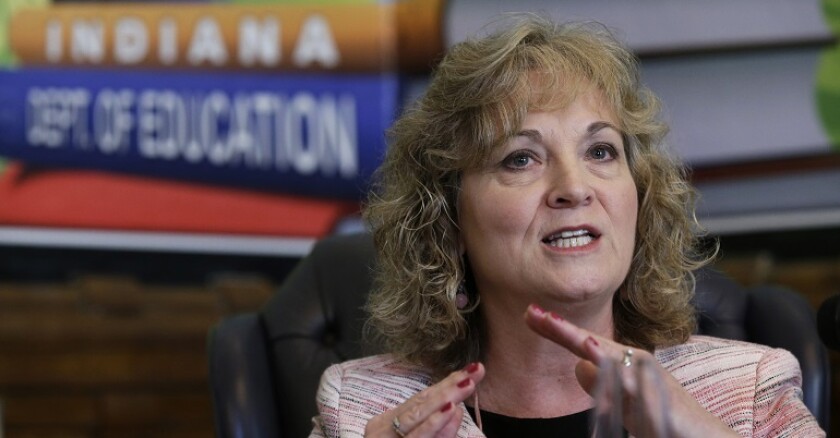These critics decried what they saw as creeping federal control of the nation’s schools -- even though Common Core was drawn up by the nonpartisan Council of Chief State School Officers and the National Governors Association.
But while Common Core has popped up here and there in this year’s campaign rhetoric, it has waned in importance. Part of the reason for the shift is that some states have already made changes.
Another reason is that Congress and President Obama enacted the Every Student Succeeds Act in 2015. The law replaced the No Child Left Behind Act, which like Common Core was focused on testing and a federal role in K-12 education. The new law is considered a course correction, easing testing requirements and devolving authority from the federal government to the states.
With Common Core on the back burner, the focus has turned -- or, one could argue, returned -- to funding. Kristen Amundson, executive director of the National Association of State Boards of Education, says several states, especially Illinois and Kansas, are locked in budget struggles over school funding. So contentious is the fight in Kansas right now that it faces a possible school shutdown this summer.
But neither of those states will elect a statewide schools chief in 2016. Instead, only five states are holding direct elections for school superintendents this fall, including several contests that are poised to be highly competitive. Several of those, including North Carolina and Washington state, will be home to debates over the amount and distribution of school funding.
Nationally, Republicans hold seven of the 10 partisan school superintendent seats that are directly elected by the voters, with Democrats holding the remaining three. (Many states give the governor the ability to appoint a schools chief; other states use varying methods.)
The GOP edge in partisan, elected schools chiefs is not surprising: Those states all voted Republican for president in 2012, often strongly so.
Indeed, the fact that Democrats have a foothold at all in these 10 states is likely a testament to the continuing influence of teachers unions, even among moderate-to-conservative voters. In the 2014 campaign cycle, Democratic superintendent candidates did well with voters in red states like Arizona, Georgia, Oklahoma and Wyoming even though they were unable to overcome a strong pro-GOP tide on Election Day.
In this fall’s superintendent elections, the Democrats have the most to lose. Each of the three Democratic-held seats are up this year and will be fiercely contested. Democratic incumbents are at risk in Indiana and North Carolina, while a Democratic-held open seat is up for grabs in Montana. It’s not out of the question that Democrats could lose all three of their seats and hand the GOP a 10-0 advantage in elected, partisan school superintendent offices.
Two other 2016 superintendent contests are also worth watching. In one, a GOP incumbent faces an intra-party challenge (North Dakota), while in the other, a free-for-all is under way to fill an open, nonpartisan seat (Washington state).
Beyond these direct elections, there are four gubernatorial seats being vacated by Democrats that have appointment power for the superintendent’s office or the state board of education. Each of these contests is competitive to one degree or another. (Three other states have gubernatorial races this year that could impact the selection of a state superintendent -- Delaware, Oregon and Utah -- but none of these gubernatorial contests is considered competitive this year.)
Here’s a state-by-state rundown of the direct elections for school superintendent taking place in 2016, along with a few other states where elections for governor could shape the direction of education policy.
Indiana: Glenda Ritz (D) is running for re-election
Four years ago, Ritz upset Tony Bennett, a conservative whose efforts to expand school vouchers and heighten accountability prompted a backlash. Bennett lost by six-points to Ritz, an award-winning teacher who ran a grassroots campaign challenging several of his policy changes.After Ritz won, Republican Gov. Mike Pence tried to do an end run around her, making the state Board of Education -- which the governor appoints -- more influential. But Pence’s moves backfired and he dropped the effort. Ultimately, the two worked together with the legislature to terminate a contractor running Indiana’s mandatory standards test after it drew increasing criticism. Now, whoever wins the office will have to draw up a new test, as well as address charter schools, vouchers, school-district consolidation, and funding fights between suburban, urban and rural districts.
In her re-election bid -- which followed a brief, abortive consideration of a gubernatorial run -- Ritz can look forward to solid funding and the backing of the Indiana State Teachers Association. Two Republicans are vying to face her. Jennifer McCormick, a small-district superintendent, is the establishment candidate, and her Tea Party-aligned opponent is Dawn Wooten, who has proposed cutting all federal funding to schools in the state.
Montana: Open seat; Denise Juneau (D) is running for the U.S. House
Montana’s open-seat contest pits recently retired elementary school teacher and Republican state Sen. Elsie Arntzen against Democrat Melissa Romano, a fourth-grade teacher.Arntzen finished far back in the pack in a U.S. House primary in 2014, though it did give her some statewide recognition. She has assembled a low-key but strongly conservative record in the legislature. She’s a strong advocate for local, rather than federal, control. Romano, meanwhile, can expect strong backing from the state teachers union. While the GOP hasn’t held this seat for 24 years, observers expect a close race.









